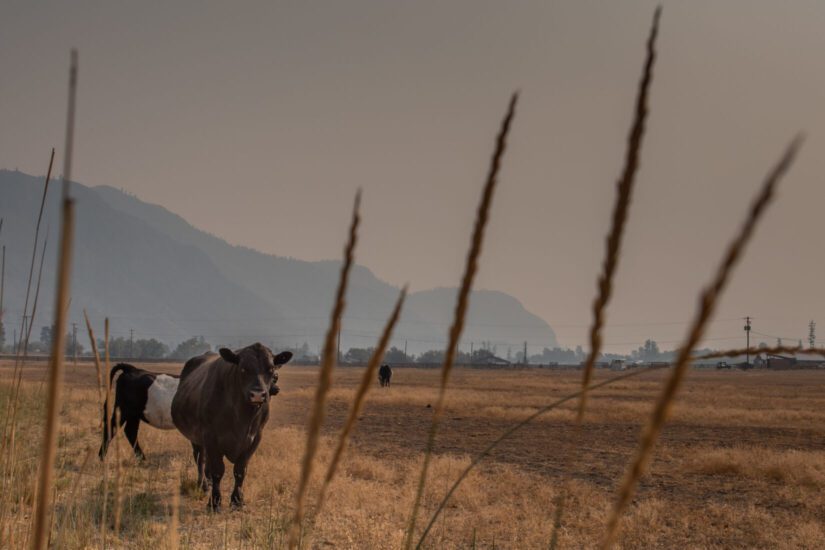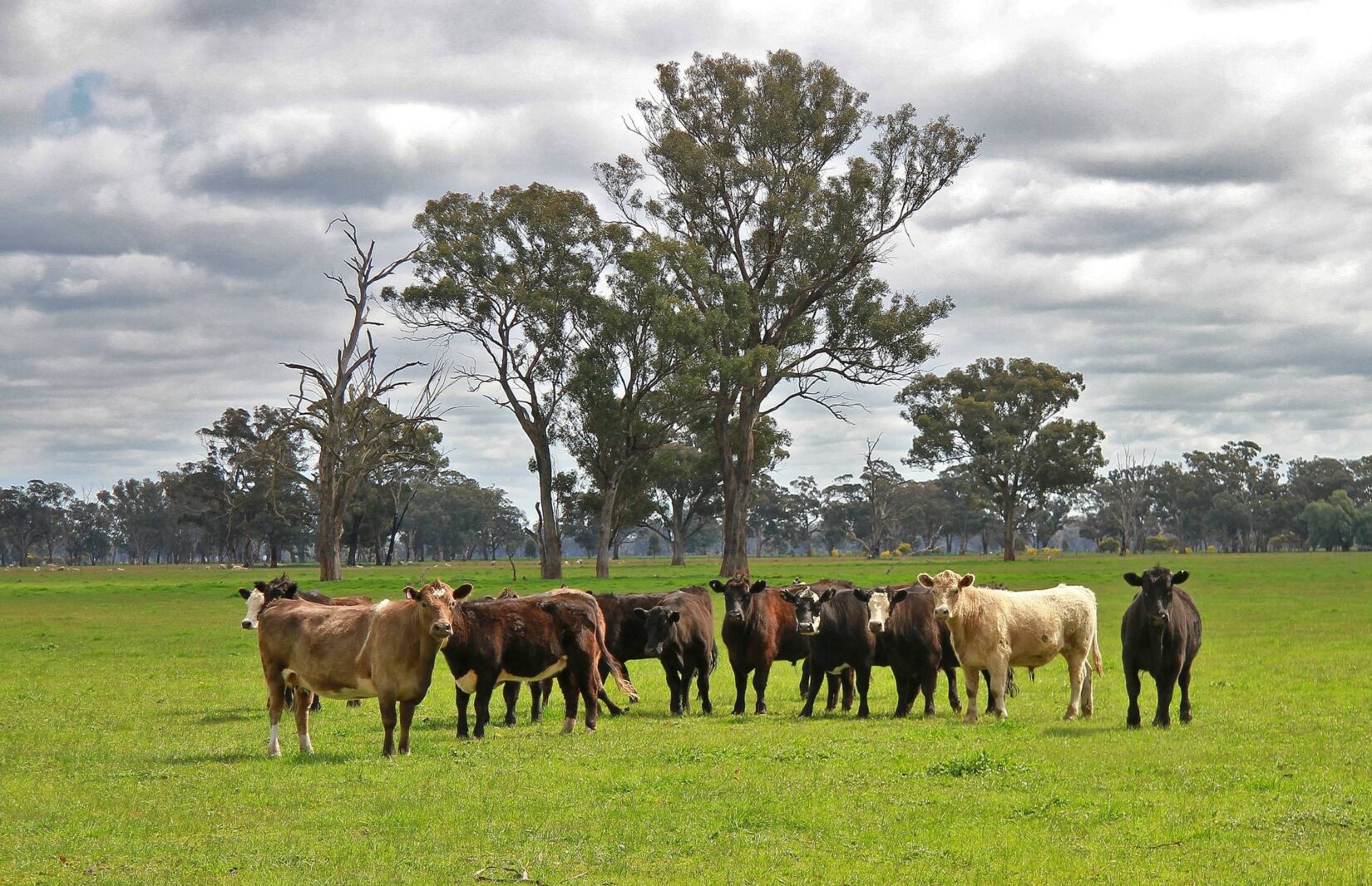The Earth’s climate is changing at an alarming rate due to the global warming crisis, resulting from greenhouse gas emissions.1 Greenhouse gases, such as carbon dioxide and methane, are air pollutants that absorb sunlight and trap heat, causing the planet to warm. The consequences of global warming include severe drought, water shortages, wildfires, flooding, rising sea levels, and extreme storms.2 Human activities are the driving force behind this crisis.1 As a result, we must consider how our actions, including dietary choices, impact the environment.

Agriculture – both plant and animal – contributes to global warming.
It’s estimated that the food system contributes 21-37% of global greenhouse gas emissions.3
The main sources of greenhouse gas emissions in animal agriculture are feed production and enteric fermentation.4 Enteric fermentation is a digestive process that occurs in ruminants, such as cattle, which produces methane gas. Sources of greenhouse gas emissions in plant agriculture include land tillage, application of fertilizers, and irrigation practices.5,6
The connection between farming and global warming can leave those who care about the environment feeling conflicted in their food choices. But there are many ways that you can change your eating habits to benefit the planet, while still protecting farm animal welfare.
1. Buy local
Many fruits and vegetables in grocery stores are imported when local products are out of season. Transportation is a major contributor to greenhouse gas emissions, as the burning of fossil fuels releases carbon dioxide into the atmosphere.5 Buying local reduces the distance food travels from farm to your plate. Try shopping at your local farmers’ market and buy what is in season.
2. Choose higher-welfare meat and dairy
Cattle raised for beef and dairy production produce more greenhouse gases than any other farm animal industry.4 By choosing beef and dairy products from cattle raised on higher-welfare farms, you can help reduce emissions. Cattle raised on higher-welfare farms have access to pasture to graze which is a natural behaviour cattle are motivated to do. Grazing can reduce emissions since it lowers the reliance on feed production (which emits greenhouse gases) to meet the animals’ nutritional needs.7 As well, responsible grazing management can help the soil capture and store carbon dioxide, removing it from the atmosphere.8
Higher-welfare animal products may come at a slightly higher cost, but you can feel confident knowing that the animals were raised to higher standards of care.

3. Reduce meat and dairy consumption
By reducing the amount of meat and dairy products you consume, you are making a difference. Today’s conventional farms are designed to meet the high demand for animal products. Unfortunately, this comes at a cost to the environment and farm animal welfare. Animals are often raised in cages, crates, or stalls at high stocking densities to maximize production. By reducing consumption, you are helping reduce the pressure on farmers to meet the high demand for intensively farmed meat and dairy products.
Eating less meat is linked to many health benefits, including a reduced risk of heart disease, stroke, diabetes, and some cancers.9 In fact, the most recent update to Canada’s Food Guide in 2019 recognizes the health benefits of eating less meat, and now recommends choosing protein sources that come from plants more often.
4. Choose plant-based
Plant agriculture may have lower greenhouse gas emissions than animal agriculture. But those choosing plant-based options must still be mindful of their food choices. There can be other harmful environmental impacts involved with plant agriculture such as water usage, land degradation, and deforestation. As well, some plant-based foods have larger environmental impacts than others. Environmentally-friendly options include:
- Oat or soy milk
Oat and soy milk require less water to produce than almond or rice milk, and have lower greenhouse gas emissions than rice milk.10
- Lentils, beans, or tofu
For plant-based proteins, lentils, beans, and tofu are great options. They have low greenhouse gas emissions, while also being good sources of fiber and nutrients. Nuts are also a great plant-based protein source and tend to have low greenhouse gas emissions. But some nuts such as almonds require high amounts of water for production.10
Reducing our consumption of intensively farmed meat can make a huge difference for farm animals and the environment. By making conscious food choices, we can support farmers who are working to reduce the environmental impact of food production while improving farm animal welfare.

References
1 Intergovernmental Panel on Climate Change – Climate Change 2021: The Physical Science Basis. Available from https://www.ipcc.ch/report/sixth-assessment-report-working-group-i/. Accessed August 27, 2021.
2 Natural Resources Defense Council – Global Warming 101. Available from https://www.nrdc.org/stories/global-warming-101#weather. Accessed August 27, 2021.
3 Intergovernmental Panel on Climate Change – Climate Change and Land. Available from https://www.ipcc.ch/srccl/. Accessed September 27, 2021.
4 Food and Agriculture Organization of the United Nations – Livestock & Climate Change. Available from http://www.fao.org/3/i6345e/i6345e.pdf. Accessed August 27, 2021.
5 United Stated Environmental Protection Agency – Sources of Greenhouse Gas Emissions. Available from https://www.epa.gov/ghgemissions/sources-greenhouse-gas-emissions. Accessed August 27, 2021.
6 Intergovernmental Panel on Climate Change – Climate Change 2014: Mitigation of Climate Change. Available from: https://www.ipcc.ch/site/assets/uploads/2018/02/ipcc_wg3_ar5_full.pdf. Accessed September 9, 2021.
7 FoodPrint – Raising Animals Sustainably on Pasture. Available from: https://foodprint.org/issues/raising-animals-sustainably-on-pasture/. Accessed September 9, 2021.
8 Stanley et al., 2018. Impacts of soil carbon sequestration on life cycle greenhouse gas emissions in Midwestern USA beef finishing systems. Available from https://www.sciencedirect.com/science/article/pii/S0308521X17310338. Accessed August 27, 2021.
9 Mayo Clinic – Meatless Meals: The benefits of eating less meat. Available from https://www.mayoclinic.org/healthy-lifestyle/nutrition-and-healthy-eating/in-depth/meatless-meals/art-20048193. Accessed August 27, 2021.
10 Poore and Nemecek, 2018. Reducing food’s environmental impacts through producers and consumers. Available from https://www.science.org/doi/abs/10.1126/science.aaq0216. Accessed September 9, 2021.
Subscribe to FarmSense e-newsletter
FarmSense is delivered four times a year and includes news about farm animal welfare, and updates on what the BC SPCA is doing to help improve the lives of farm animals in Canada.
The BC SPCA uses your personal information to update you on our work for animals as well as for advertising and analytics purposes. More information on uses and how to opt-out can be found in our Privacy Policy.
